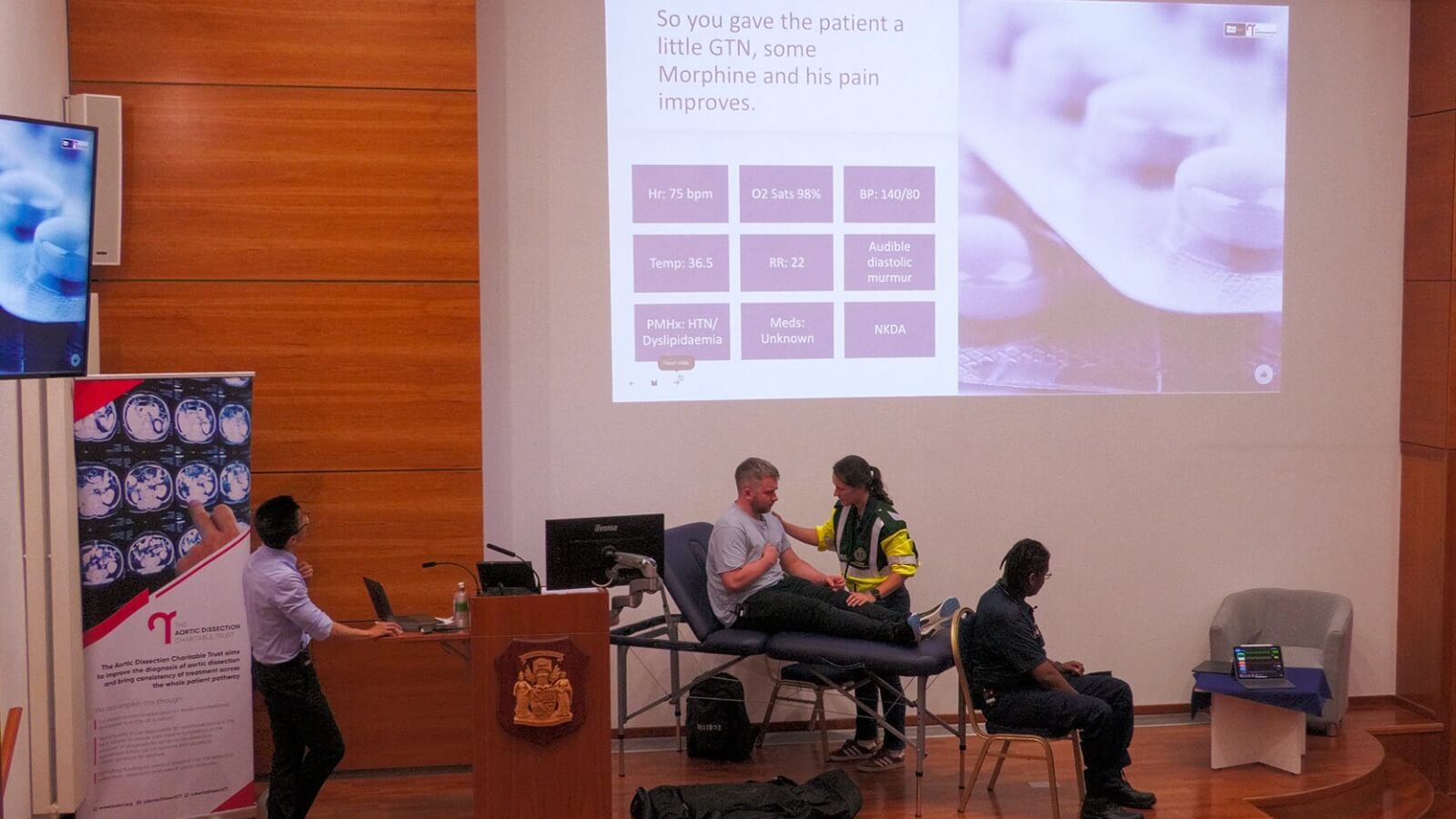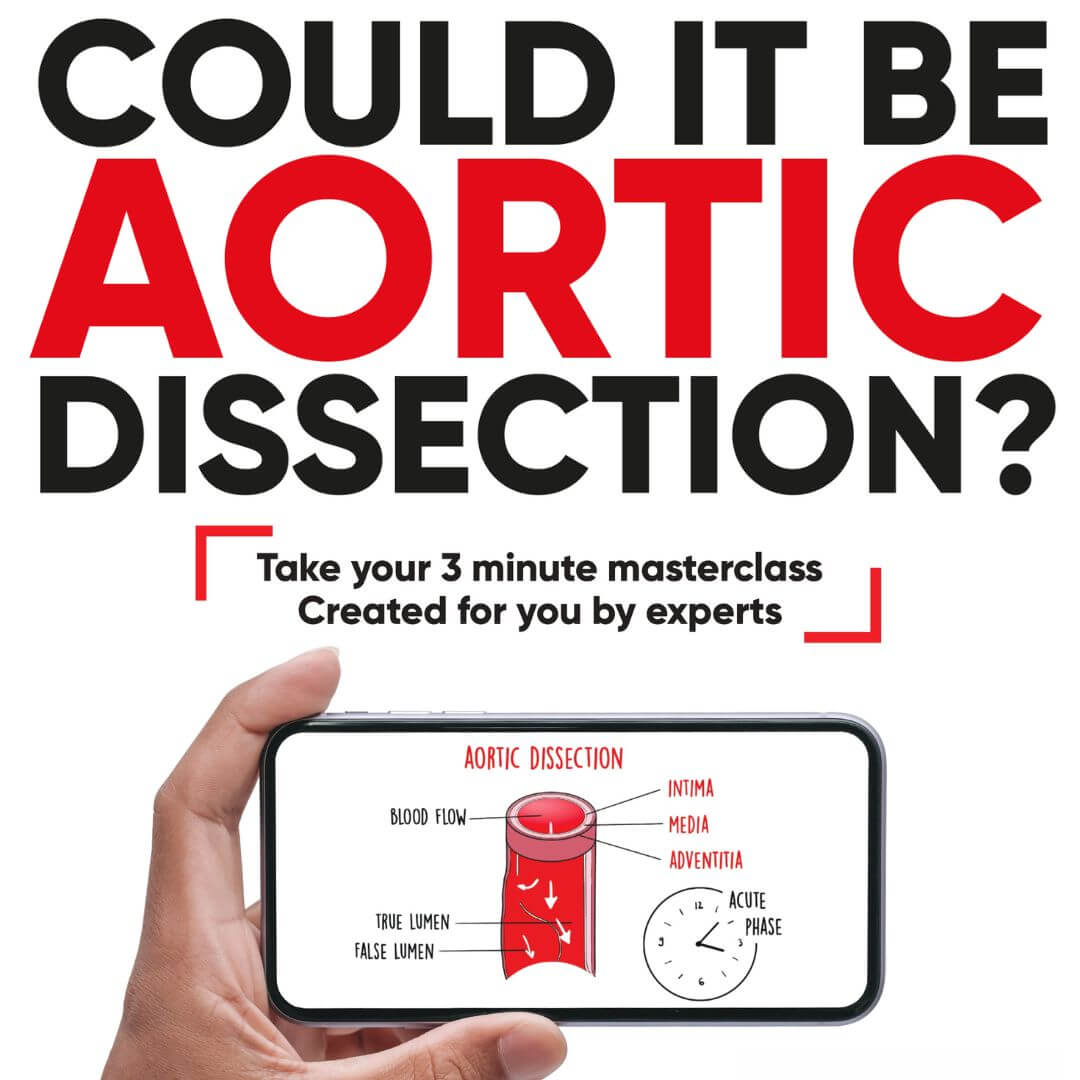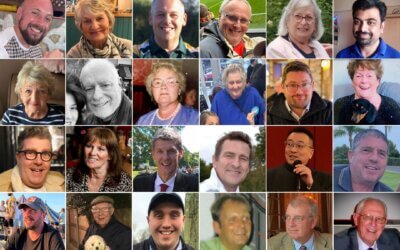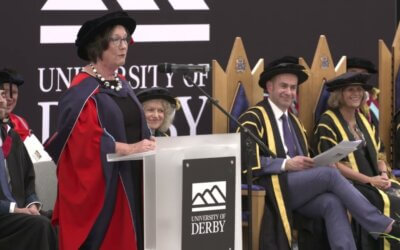At the Aortic Dissection Charitable Trust, we prioritise our efforts and resources in educating healthcare professionals and transforming the care pathways for aortic dissection patients across the UK and Ireland. The Scottish Aortic Dissection Education Event 2024, held at The Royal College of Physicians and Surgeons of Glasgow, is a cornerstone of this mission. Bringing together paramedics, emergency medicine specialists, and other healthcare professionals, this event serves as a vital platform for sharing the latest knowledge, skills, and strategies in the management of aortic dissection.
The charity is committed to improving the diagnosis and treatment of aortic dissection, and this annual event is one of many ways we aim to create meaningful, systemic change. By equipping frontline healthcare professionals with the most up-to-date information and hands-on experience, we work towards ensuring that every patient with aortic dissection receives swift, accurate, and effective care.
Morning Lectures: Real-Life Stories and Practical Insights
The day began with an inspiring series of lectures that combined clinical expertise with personal patient stories, reminding everyone of the real-world impact that early diagnosis and effective treatment can have on lives.
Pre-Hospital Management: Lessons from the Scottish Ambulance Service
Donald McPhail, Clinical Effectiveness Lead at the Out-of-Hospital Cardiac Arrest (OHCA) division of the Scottish Ambulance Service, delivered a critical session on pre-hospital management of suspected aortic dissection. His presentation, rich with real-life case studies, highlighted the vital role paramedics play in early recognition and management of this life-threatening condition. Through examples of cases where rapid intervention made the difference, Donald reinforced the importance of continuous training and adherence to protocols in saving lives before patients even reach the hospital.
Transforming Systems: The Hull Approach to Diagnosing Aortic Dissection
Leigh Norman, Advanced Clinical Practitioner from Hull, shared her team’s experiences in leading systemic change in aortic dissection diagnosis. Her lecture provided an inspiring look at how targeted education, improved communication, and updated protocols transformed the way aortic dissection is handled in Hull. Leigh’s talk underscored the charity’s commitment to working with healthcare systems to implement similar changes across the UK, ensuring faster, more accurate diagnosis for all patients.
Managing Acute Aortic Syndromes in the Emergency Department
Richard Price, Consultant in Anaesthesia and Intensive Care at the Royal Alexandra Hospital, took the audience through the critical steps involved in managing acute aortic syndromes (AAS) in the emergency department. His lecture focused on the need for swift, informed decision-making to improve patient outcomes, offering clear guidelines on recognising AAS and managing these complex cases in high-pressure environments. This type of knowledge-sharing is essential to improving emergency care and ensuring that healthcare professionals are fully equipped to act when minutes matter most.
Decision Making Under Pressure
Allan Jones, an International Policing Advisor, delivered a unique session on the psychology of decision-making under pressure. Drawing from his experience in high-stakes environments, Allan shared insights that resonated deeply with the emergency medicine professionals in the room. The ability to make sound, rapid decisions in critical moments is a skill that all emergency responders must hone, and Allan’s talk offered practical techniques for maintaining clarity and focus in even the most stressful situations.

Afternoon Workshops: Practical Skills for Real-World Impact
The afternoon was dedicated to hands-on learning, where attendees could choose from two specialised tracks designed to sharpen their practical skills in diagnosing and managing aortic dissection.
Emergency Case Studies: Learning from Experience
In one of the key afternoon sessions, healthcare professionals had the opportunity to engage in a live simulation session led by TheCase.Report team, a respected podcast and educational platform for emergency medicine providers. This simulation focused on real-world emergency scenarios involving aortic dissection, allowing participants to work through the complexities of diagnosis and treatment in a high-pressure, hands-on environment.
By walking through these cases, attendees were able to practise the decision-making processes critical to successful outcomes, particularly in fast-moving emergency settings. The simulation highlighted the importance of quickly identifying the often subtle signs of aortic dissection and making informed, timely choices to ensure the best possible patient care. Participants also benefited from interactive discussions, where they explored different approaches and learned from each other’s experiences, reinforcing the collaborative spirit at the heart of the event.
PoCUS Training: Empowering Healthcare Professionals
The second track focused on Point-of-Care Ultrasound (PoCUS), an increasingly important tool in the consideration of aortic dissection. Led by experts from the Edinburgh Royal Infirmary, this workshop demonstrated how PoCUS can rapidly identify the signs of an acute aortic dissection, such as an intimal flap, dilated aorta, or pericardial effusion. The session provided attendees with hands-on experience using PoCUS to visualise key anatomical structures, offering them the skills needed to expedite advanced imaging, mobilise consultants, and make informed decisions swiftly.
By offering practical PoCUS training, we aim to equip more healthcare professionals with the ability to rapidly and accurately rule in aortic dissection, improving patient outcomes and reducing time to treatment.
TheCase.Report: A Community of Learning
As part of our commitment to fostering continuous education and collaboration, we were thrilled to feature TheCase.Report at this year’s event. TheCase.Report, which serves as a podcast and learning platform for emergency medicine professionals, is a trusted partner of the charity. Their dedication to expanding the conversation around aortic dissection, along with the Irish Association for Emergency Medicine and Irish Emergency Medicine Trainees Association, particularly in emergency settings, aligns perfectly with our mission to improve patient outcomes through knowledge-sharing and systemic change.
Advancing Aortic Dissection Care Through Education
The Scottish Aortic Dissection Education Event 2024 was a resounding success, reflecting the charity’s commitment to advancing the understanding, diagnosis, and management of this life-threatening condition. Through a combination of expert-led lectures, interactive case studies, and practical skills workshops, we continue to build a community of well-informed, highly skilled professionals capable of delivering the best possible care to patients with aortic dissection.
We are grateful to Terumo Aortic for their sponsorship, and to the many healthcare professionals who attended and contributed to this event. Together, we are making strides toward a future where aortic dissection is consistently diagnosed early and treated effectively, saving lives across the UK and Ireland.




